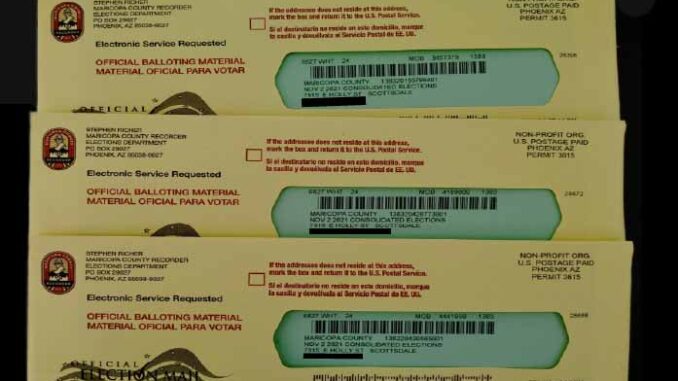
Elections are underway in several Arizona counties, and concerns are popping up about whether voter registration files are being sufficiently updated to prevent voter fraud.
In Maricopa County, where the City of Scottsdale is conducting an all-mail Special Election, Anthony Massara was stunned to find three ballots in his mailbox, each with the name of a different person he did not know.
Massara told Arizona Daily Independent he purchased his Scottsdale home in 2017. The prior owner used the property as a rental for several years, so when various election mail was delivered in the names of other people Massara simply returned the items to the post office with a note that the person did not live at the address.
He did the same thing during the 2020 General Election when he received early ballots (also known as absentee ballots) for three or four voters. But when Massara received three ballot envelopes last week for Scottsdale’s current election, he got in touch with Rep. Leo Biasiucci (R-LD5) who has been a vocal critic of Maricopa County’s election integrity measures.
“It is because of citizens like Anthony, who had the courage to speak up, that we can see just how flawed our election process is,” Biasiucci said after reviewing the ballots Massara received.
 Meanwhile, a Mohave County woman tweeted an image of three early ballots received at her address last week. Each ballot contained the name of a different voter, only one of whom lived at the address. The woman noted it appears the two other ballots are in the names of deceased voters.
Meanwhile, a Mohave County woman tweeted an image of three early ballots received at her address last week. Each ballot contained the name of a different voter, only one of whom lived at the address. The woman noted it appears the two other ballots are in the names of deceased voters.
A similar issue was reported by a voter in Prescott, located in Yavapai County, where early voting began Oct. 6.
Cochise County Recorder David Stevens says it will be easier to resolve such ballot complaints in the future thanks to Senate Bill 1530, a voter registration integrity law that took effect Sept. 29. The bill was introduced by Sen. J.D. Mesnard (R-LD17).
According to Stevens, SB1530 provides guidance for anyone who receives an early ballot addressed to someone who does not live at the address. It mandates that each election officer responsible for preparing early ballots must ensure the mailing envelope contains an option for marking the envelope with a “return to send” type instruction.
Once the U.S. Postal Service returns the ballot to the mailing county, the Recorder’s Office will send a formal notice to the voter of the bad address report. This protects voters against having someone interfere with their voter registration.
If there is no answer to the recorder’s letter after 35 days, Stevens explained that the voter file in question will be marked “inactive.” This ensure no early ballots are mailed out until the voter updates his or her registration.
And if that voter is never heard from again, Stevens says federal law dictates the process for removing the voter from the rolls after two federal election cycles.
For Biasiucci, cleaning up Arizona’s voter rolls reduces the chance of ballots being stole and used to cast an illegal vote. And it has another benefit, he pointed out.
“We are also potentially saving taxpayers hundreds of thousands of dollars by not printing and mailing out unnecessary ballots,” he said.
My sister hasn’t lived, voted or paid taxes here for 15 years. She votes in CA. Yet somehow she’s registered to vote and keeps getting ballots at my parents address!
I wonder if anyone votes in her name on Election Day? Mail in voting either needs to get cleaned up or go away. pic.twitter.com/FSwXoykEgO
— Travis Grantham (@TravisGrantham) October 10, 2021
